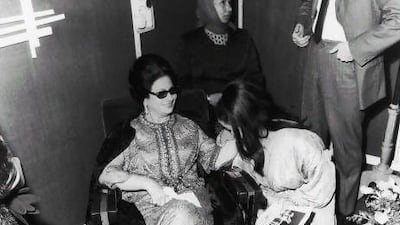In the final instalment of our Music of the Arab World series, we take a look at the crooners and songbirds who defined the era of classical Arabic music.
Freedom
It is important to make a distinction when speaking about the term "classical" in Arabic music. Where in the West, the term denotes orchestral pieces from centuries past, the Arab world's version refers mostly to the era of the crooners and songbirds who date back to the early 1920s. The roots of the movement lay in Egypt and other Arab countries that have gained independence from foreign rule. Hence, the first wave of the genre was dedicated to nationalistic songs. As well as his own popular works, the Egyptian singer and composer Mohammed Abdel Wahab wrote the stirring Ya Beladi, the national anthem used by the Kingdom of Libya from 1951 to 1969 and again when it was brought in by the post-Qaddafi National Transitional Council in 2011.
The Big Four
Classical Arabic music does tip its hat to its western counterparts. Pieces are often defined by lush orchestral arrangement, operatic suites and jazz elements. No artists defined this style more than The Big Four, consisting of Egypt's Umm Kulthum, Abdel Halim Hafez and Mohammed Abdel Wahab and Syria's Farid Al Atrash. These four solo artists established the sound of classical Arabic music through blending evocative poetry, sterling musicianship and dedicated performance.
Umm Kulthum
If you venture to some of the Tourist Club's old shisha cafes, there is a high chance of encountering the deep vocal treasure that is Umm Kulthum. Widely regarded as the greatest singer in the history of Arabic music, Kulthum demonstrated through her near 50-year career - from the early 1920s until her death in 1975 at the age of 76 - that classical Arabic music can be for the people, rather than just for the elite. Her epic performances owed a lot to opera as she incorporated vocal suites and musical interludes. As such, her performances could last for up to four hours and include only two or three songs. Lyrically, Kulthum always aimed for the heart. Working with the celebrated Egyptian romantic poet Ahmed Rami and the composer Mohammed El Qasabgi, her songs were hailed for providing comfort to the downtrodden and for galvanising Egyptian soldiers who were stationed abroad.
Abdel Halim Hafez
Known as The Nightingale, Hafez was the quintessential crooner. His romantic and patriotic songs, delivered in his sensual deep vocals, captured the heart of the Arab world. His death in 1977 prompted an unprecedented outpouring of grief across Egypt.
Farid Al Atrash
Known for his prolific stable of work, the "King of the Oud" recorded more than 500 songs and starred in more than 30 films in a four-decade-long career. As well as his virtuoso playing, Al Atrash was known for his mawals, a form of vocal improvisation sometimes used to usher in the next musical performance.
Mohammed Abdel Wahab
Mohammed Abdel Wahab was the most western-oriented from this classical bunch. He created his classic 1941 Al Gondol using a waltz rhythm while in the 1950s he experimented with other genres including rock'n'roll.
Other greats
"The Lebanese Jewel" and "Ambassador to the Stars" are just two of the many nicknames attributed to the enigmatic Lebanese songstress Fairuz. After making her mark at Lebanon's Baalbek International Festival in 1957, Fairuz went on to perform solo concerts and operettas. Her music reflected her country's fortunes, taking on a more political stance during the Lebanese Civil War. Her international pedigree resulted in massive overseas performances, too, including one in front of 16,000 people at the Las Vegas MGM Grand Arena in 1999. She continues to record and tour internationally.
The late Syrian singer Asmahan posed the only serious competition to Umm Kulthum in the singing stakes. Blessed with a dynamic vocal range, she starred in numerous operettas in the late 1930s but her career never really reached its peak due to personal turmoil.
Meanwhile, the grand title of "The Voice of Lebanon" remains the domain of Wadih El Safi. Throughout his 60-year career, El Safi's poetic folk music inspired future generations of Lebanese stars including Fairuz, Sabah and Najwa Karam.
Playlist
Here are a few picks to help you journey back in time:
• Abdel Halim Hafez: Ala Hasb Wedad (1996)
Hafez was more of a live singer than a studio artist. This soulful live recording is an example of how he could make a packed arena venue feel intimate.
• Fairuz: Al Mahatta (1974)
Recorded during one of her career's many peaks, this album is a fine recording of one of the singer's many musical plays.
• Umm Kulthum: The Legend (2007)
A great two-hour compilation introducing you to what many deem the finest voice to have ever graced the Arab stage.
Follow
Arts & Life on Twitter
to keep up with all the latest news and events


